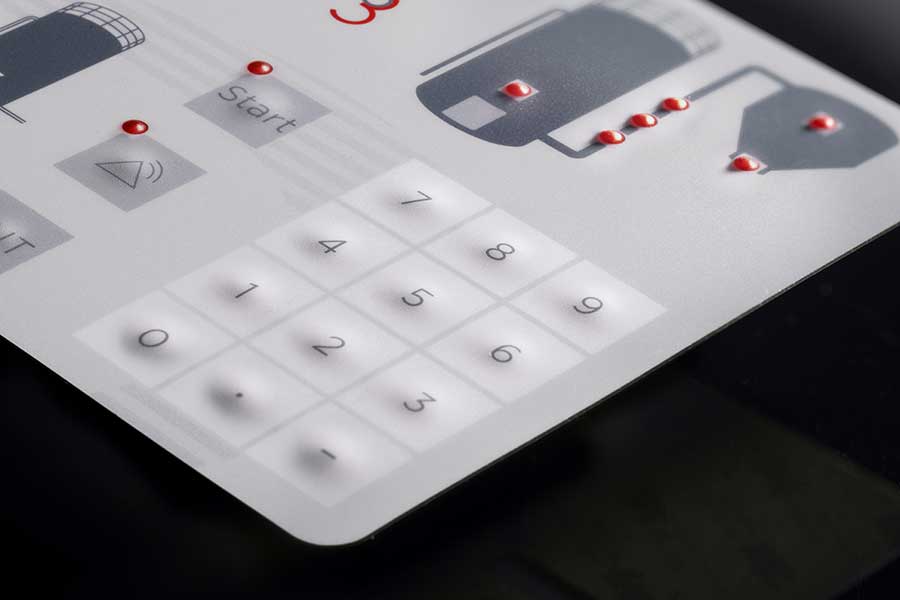How Membrane Switches Are Designed for Easy Maintenance and Repair
How Membrane Switches Are Designed for Easy Maintenance and Repair
Blog Article
Comprehending the Significance of Membrane Switches in Interface
Membrane switches are indispensable elements in the layout of effective interface, facilitating not just functionality yet likewise improving visual allure and user interaction. Their unique attributes, such as resistance to ecological elements and customizable designs, make them ideal for a diverse variety of applications across several industries. As we explore the different benefits and future fads linked with Membrane technology, it ends up being clear that these switches are greater than just parts; they stand for a convergence of advancement and usefulness. The implications of this technology on individual experience deserve taking a look at better.
What Are Membrane Switches?

The spacer layer, which consists of glue residential properties, permits for the separation of the circuit layer from the overlay, making sure that the switch remains in a non-activated state until pushed. When stress is put on the overlay, it presses the spacer layer, linking the gap and completing the circuit in the underlying layer. This style not just minimizes the physical area required for standard mechanical switches however additionally boosts the resilience of the device, as Membrane buttons are generally resistant to dirt, dampness, and other ecological factors.
Commonly located in applications varying from customer electronics to medical gadgets, Membrane buttons are important to contemporary technology, providing a easy to use and effective user interface that straightens with contemporary style needs.
Benefits of Membrane Buttons
While various switch modern technologies exist, Membrane Switches deal distinctive benefits that make them especially desirable in different applications. Among the key advantages of Membrane buttons is their small design, which permits space-saving implementations in gadgets where property is limited. Their slim account not just boosts visual allure but also helps with lightweight building and construction.
An additional substantial advantage is their resistance to environmental elements. Membrane switches are generally secured versus wetness, dirt, and pollutants, making them perfect for usage sought after settings, such as medical tools and commercial equipment. This sturdiness prolongs the lifespan of the switch, minimizing upkeep expenses and enhancing integrity.
Furthermore, Membrane switches can be personalized to satisfy certain design demands, integrating distinct graphics and colors that improve user communication. Their responsive feedback options can also be customized to give a rewarding individual experience. Furthermore, Membrane buttons are cost-efficient, especially in high-volume applications, as they can be produced effectively.
Applications in Various Industries

In the consumer electronics field, Membrane buttons are prevalent in devices such as microwaves, washing devices, and remotes. Their responsive feedback and visual alternatives boost user experience while offering a sleek, contemporary appearance. In addition, automobile producers use Membrane switches in dashboard controls and infomercial systems, where space is limited, and individual engagement is vital.
Furthermore, the industrial market leverages Membrane switches in control panels for machinery and equipment, enabling user-friendly operation in commonly harsh atmospheres. Their resistance to chemicals and wetness ensures long life and reliability in these applications. On the whole, the adaptability of Membrane Switches contributes substantially to their widespread use, making them indispensable click here now in numerous technological domain names.
Design Considerations for Membrane Buttons

When developing Membrane buttons, a number of vital factors to consider have to be thought about to make certain ideal capability and individual experience. First of all, the choice of materials is essential; choosing durable, top notch substratums can boost the button's durability and resistance to environmental factors such as moisture and temperature variations.
Second of all, the style of the graphic overlay need to focus on clearness and ease of usage. Symbols and message need to be readable, and the design must assist in intuitive communication (membrane switches). Furthermore, responsive responses is vital; incorporating a responsive dome or various useful source other devices can boost the individual experience by providing physical confirmation of activation
Another vital aspect is the switch's electrical performance. Developers must ensure that the conductive traces are appropriately designed to lessen resistance and stay clear of signal interference. This includes evaluating the required actuation force and guaranteeing compatibility with the electronic parts they will user interface with.

Future Patterns in Membrane Modern Technology
As technology remains pop over to this site to breakthrough, Membrane switches are poised to advance dramatically, driven by advancements in products and producing methods. One emerging fad is the unification of advanced materials, such as conductive inks and adaptable substratums, which improve durability and minimize the overall weight of Membrane switches. These materials not just improve the tactile action but additionally enable the style of buttons that can withstand harsher ecological problems.
In addition, the integration of touch-sensitive technologies is changing typical Membrane Switches into even more interactive individual interfaces. Capacitive touch sensors installed within Membrane button panels can supply an extra responsive and user-friendly user experience, lining up with the growing need for sleek, modern-day styles in customer electronics.
Furthermore, developments in printing methods, such as digital and 3D printing, make it possible for quick prototyping and customization of Membrane switches. This flexibility enables producers to react faster to market demands and consumer preferences.
Last but not least, sustainability is coming to be a considerable focus, with manufacturers discovering environment-friendly materials and processes. As these trends unfold, the future of Membrane modern technology guarantees boosted performance, aesthetic allure, and ecological duty, solidifying their function in advanced interface throughout numerous sectors.
Final Thought
In conclusion, Membrane Switches stand for a vital component in the style of individual interfaces, integrating performance with aesthetic flexibility. As developments in technology proceed, the advancement of Membrane buttons is anticipated to further fine-tune customer interfaces, driving advancement and enhancing usability in an increasingly complicated technical landscape.
Membrane buttons are essential elements in the style of effective user interfaces, facilitating not just performance but likewise boosting aesthetic charm and individual communication.Membrane Switches offer as an essential component in numerous user interfaces, promoting a seamless communication in between individuals and electronic tools.While numerous switch technologies exist, Membrane Switches offer distinctive benefits that make them particularly desirable in numerous applications.Additionally, Membrane switches can be tailored to fulfill certain style demands, including special graphics and shades that boost individual communication.In final thought, Membrane Switches represent an important part in the design of customer interfaces, integrating performance with visual flexibility.
Report this page